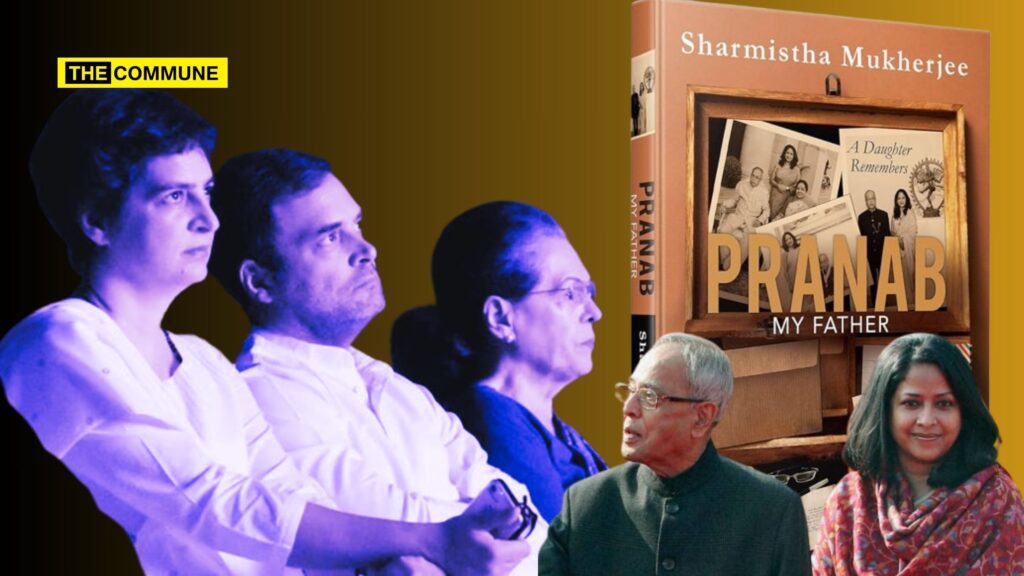A recently published book titled “Pranab, My Father: A Daughter Remembers” by Sharmishta Mukherjee, daughter of former president Pranab Mukherjee, reveals how the late Congress leader and former Indian President strongly denounced Rahul Gandhi’s behaviour and how the Gandhi family wreaked havoc on the Congress party. It meticulously unveils significant events during the UPA years, relying on Mukherjee’s habit of maintaining detailed diaries since the early 1960s.
The book gives an insider account of Pranab Mukherjee’s critical perspective on Rahul and Sonia Gandhi, as revealed through Mukherjee’s personal diary entries.
Here’s an excerpt from the book which apparently Pranab Mukherjee wrote just a month before his death on .
By making Congress a preserved playground for Gandhi-Nehru family, Congress lost its democratic character which impacted the polity of the country. After independence, if 5 family members of the same family controlled the Congress presidency for 37 years, it speaks of the worst form of hegemony. The family today is no longer providing vitality to the organisation but eating away its strength. Sonia Gandhi and Rahul since 2004 have lost base acquired even partially by Soniaji in 2001-2003. They are just interested in somehow forming a government at the Centre under Congress with other regional parties.
Mukherjee expresses particular criticism of Rahul, citing instances of political immaturity and lack of commitment. Notably, Mukherjee disapproves of Rahul’s public dismissal of a Cabinet decision in 2013, viewing it as a detrimental move for the Congress. Sharmishta recounts her father’s strong reaction to this incident, highlighting his concern about the impact on the Prime Minister, the government, and the party’s image.
Here’s the excerpt from the book as published in Firstpost:
Rahul Gandhi gate-crashed a press conference by Ajay Maken and described the decision of Cabinet as “nonsense”. This is totally uncalled for. He has all the arrogance of his Gandhi–Nehru lineage without their political acumen.
Sharmishta notes that it was her who first broke the news to her father. She says in the book that it was after a long time in her life that she saw her father’s face turn red in anger. Pranab Mukherjee reportedly told his daughter:
Who does he [Rahul] think he is? He is not a member of the Cabinet. Who is he to publicly trash a Cabinet decision? The Prime Minister is abroad. Does he even realize the implication of his actions and the effect it will have on the Prime Minister and the government? What right does he have to humiliate the PM like this? The party’s vice-president had shown such disdain for his own government publicly. Why should people vote for you again?
Engaged in the operations of the Delhi Congress unit herself, Sharmishta remembers informing Mukherjee about Rahul’s earnest efforts within the party to prevent the promulgation of the ordinance, although his attempts went unheard. Upon sharing this with her father, Mukherjee made a pointed comment, suggesting that despite his extensive political experience and influential role in the party, if Rahul couldn’t convince his colleagues without relying on dramatic actions, perhaps politics was not his true calling.
Sharmishta also noted that the Gandhi family namely – Sonia Gandhi, Rahul Gandhi and Priyanka Gandhi – never trusted anyone except each other, as per the assessment of her father Pranab Mukherjee.
While the book is not entirely critical of Rahul, acknowledging his courtesy and curiosity, Mukherjee points out his political immaturity. The book also sheds light on Mukherjee’s interactions with Rahul, where he advised him to gain firsthand governance experience by joining the Cabinet, a suggestion that Rahul did not act upon.
On 25 March 2013, Pranab Mukherjee had noted:
He [Rahul] has interest in a diverse range of subjects but moves very quickly from one subject to another. I don’t know how much he listened and absorbed.
The book also includes instances of disagreement within the Congress, such as Sonia Gandhi’s objection to placing Savarkar’s portrait in the Central Hall, a decision Mukherjee defended in his diary, emphasizing Savarkar’s patriotism despite differences in later views. He had apparently told Sonia Gandhi that writing mercy petitions to the British does not reduce his sacrifice and patriotism.
Pranab Mukherjee reportedly wrote in his diary:
I told her firmly that I agreed in the meeting [of the Parliamentary Committee] to the proposal as I consider him a patriot, whatever be his views in the later years. People have become so small. How can one forget the sufferings Savarkar brothers had to undergo in cellular jail?
Subscribe to our channels on Telegram, WhatsApp, and Instagram and get the best stories of the day delivered to you personally.

